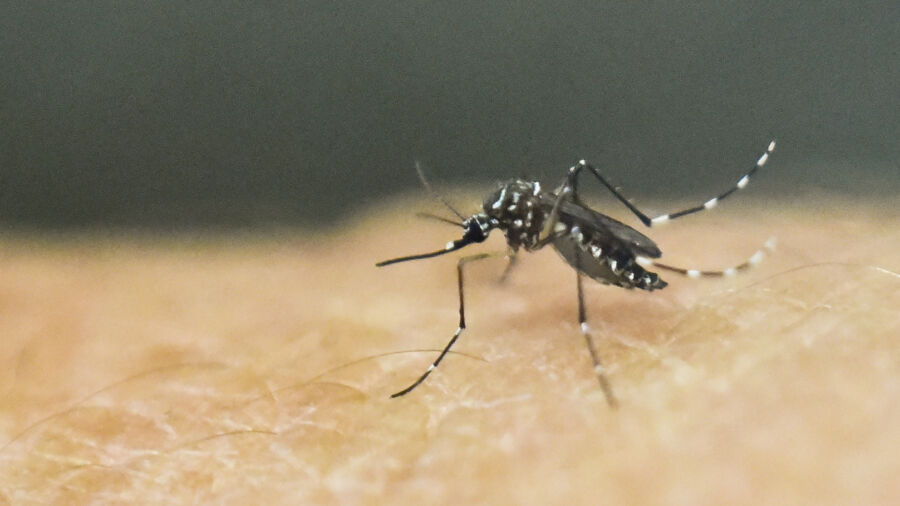Massachusetts’ public health agency has reported this year’s first human cases of the West Nile virus, a deadly disease that can be spread via mosquitoes, and is urging Americans to take precautions.
In a statement on Aug. 29, the Massachusetts Department of Public Health (DPH) announced that a male in his 40s was exposed to the West Nile virus in Middlesex County, a region that was already known to be at moderate risk.
The second individual, a woman in her 70s, was exposed to the virus in another part of the country, according to the agency, which indicated that there are no additional risk level changes at this time.
The state’s DPH said that the risk of human infection is at a moderate risk level in the Greater Boston area, which includes Middlesex County, Norfolk County, and Suffolk County, as well as in parts of Berkshire County, Bristol County, Hampden County, Hampshire County, Plymouth County, and Worcester County.
“This is the first time that West Nile virus infection has been identified in Massachusetts residents this year,” said Dr. Robert Goldstein, commissioner of the Massachusetts DPH.
Dr. Goldstein added that Massachusettsans are at the highest risk of contracting the deadly virus in the Bay State during the months of August and September.
“Populations of mosquitoes that can carry and spread this virus are fairly large this year and we have seen recent increases in the number of WNV-positive mosquito samples from multiple parts of the Commonwealth,” he said.
In 2022, Massachusetts identified eight human cases of the West Nile virus, which is usually transmitted to humans through the bite of an infected mosquito. The first case of human infection was identified in an elderly woman in Suffolk County on Aug. 25, the agency said in a statement at the time.
Protect Yourself From Mosquito Bites
While the West Nile virus can infect people of all ages, those above the age of 50 are at a higher risk level for severe disease. Most people infected with the virus will experience no symptoms, but severe illness can occur in rare cases.
Most people who experience mild signs and symptoms of a West Nile virus infection generally recover on their own. In about 20 percent of cases, symptoms typically appear between 2 and 14 days after being bitten and can include fever, headache, body aches, rash, diarrhea, and vomiting, according to the U.S. Centers for Disease Control and Prevention (CDC) website. The more serious symptoms include severe headaches, confusion, muscle weakness, or paralysis.
Meanwhile, the Massachusetts DPH has offered tips for residents on how to protect themselves from mosquito bites, including using repellent when outdoors, wearing long sleeves, and wearing long pants. They also advised people to drain pools and puddles with standing water, which is where mosquitos lay their eggs.
People are also advised to install and repair screens on all windows and doors in their homes, keep gutters clear of debris, cover trash containers, and change the water in pet dishes.
“We are coming to the unofficial end of summer but mosquitoes with West Nile virus will persist for several more months,” State Epidemiologist Dr. Catherine Brown said on Aug. 29. “We also encourage everyone to regularly visit DPH’s mosquito-borne diseases web pages to stay informed on when and where WNV activity is occurring,” she added.
Potentially Dangerous
There are no vaccines or medicines to deal with the West Nile virus, which is a member of the flavivirus genus. About 1 in 5 people who are infected develop a fever and other symptoms, while about 1 in 150 people develop a serious illness that can be deadly.
“The death rate among those showing symptoms of severe West Nile infection (encephalitis or meningitis) is around 10%. Most severe cases occur in elderly people,” according to the CDC’s website.
West Nile virus is rarely transmitted from one person to another person, as generally, mosquitoes are the primary vector. The primary hosts of the virus are birds, officials say.
Health officials at the University of California–San Francisco said mosquitoes become infected with the pathogen when they feed on infected birds. Crows, jays, ravens, and magpies are particularly susceptible to the West Nile virus.
According to CDC data, 455 cases have been reported in 36 states across the United States this year as of Aug. 29, including in Arizona, California, Colorado, Florida, Oregon, Wyoming, Nebraska, Illinois, South Carolina, Georgia, and Pennsylvania. There were 1,126 cases of the West Nile virus reported in all of 2022, down from 2,911 cases in 2021, CDC data show.
A form of West Nile virus circulating in Tunisia and Israel in 1999 was imported to New York state, “producing a large and dramatic outbreak that spread throughout the continental United States” in the 2000s, according to the World Health Organization (WHO).
“The largest outbreaks occurred in Greece, Israel, Romania, Russia and USA,” the WHO said. “Outbreak sites are on major birds migratory routes. In its original range, WNV was prevalent throughout Africa, parts of Europe, Middle East, West Asia, and Australia. Since its introduction in 1999 into USA, the virus has spread and is now widely established from Canada to Venezuela.”
Jack Phillips contributed to this report.

